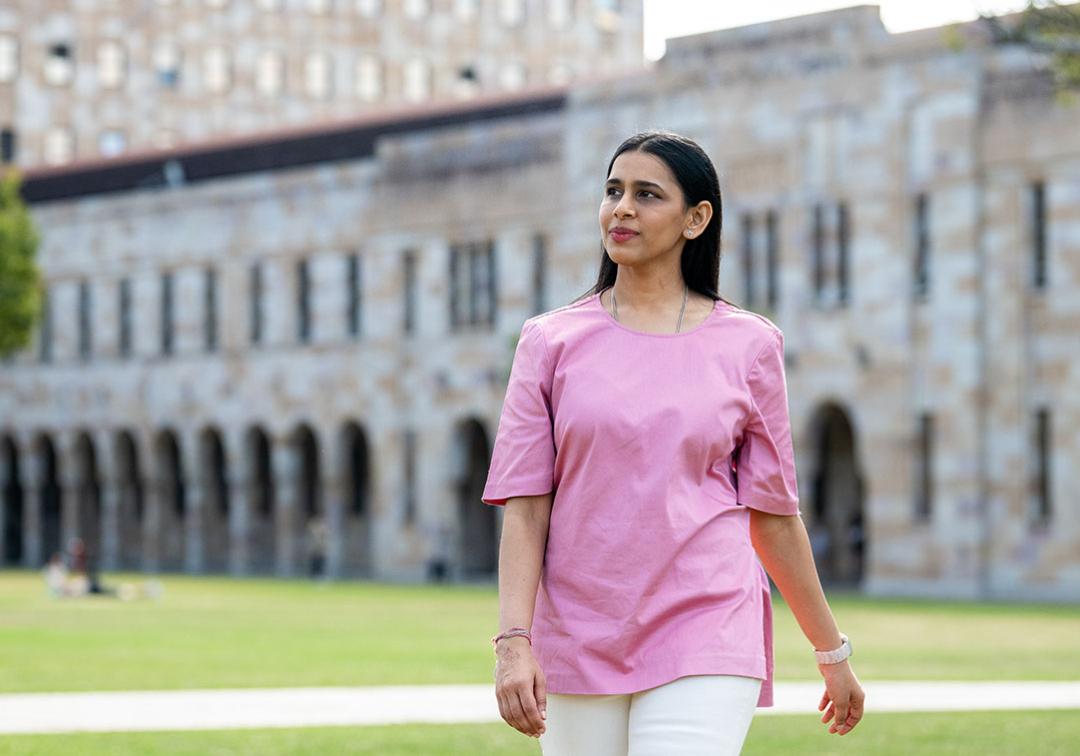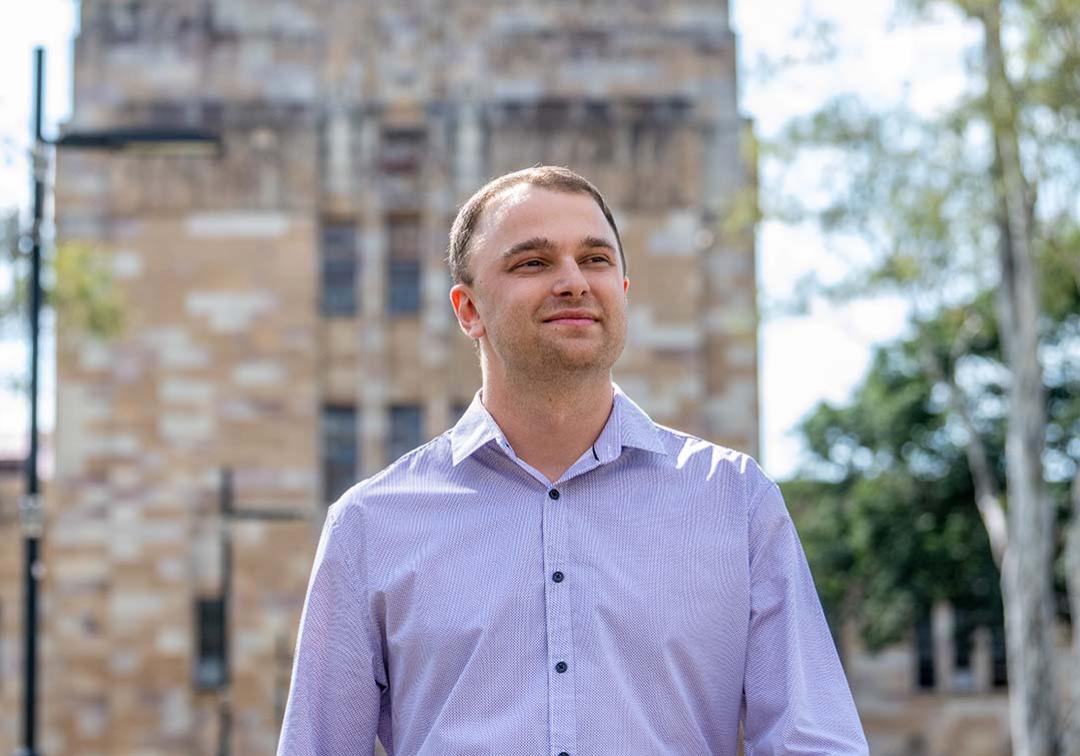
Graduate Diploma in Science
Overview
Expand your expertise in mathematics, physics or statistics and meet the growing demand for high-level scientific skills.
The Graduate Diploma in Science is designed for graduates who have majored in mathematics, physics or statistics and want to deepen their knowledge.
In one year of full-time (or part-time equivalent) study, you’ll choose from a variety of courses, gaining specialised knowledge and valuable skills in your field.
UQ’s science program equips you for a rewarding career. Many mathematics graduates pursue higher degrees and research roles at major institutions; while physics graduates develop sought-after analytical and problem-solving skills, valued across industries. Statistics graduates are in high demand in business, industry, research and government.
Program highlights
- Study at UQ's Faculty of Science, renowned for teaching and research excellence.
- Leverage UQ’s strong industry and government partnerships.
- Apply your knowledge through collaborations, research projects, commercial ventures and industry placements.
Fields of study
Tailor your studies to suit your goals. This program offers these options:
- Applied Mathematics
- Mathematics
- Physics
- Statistics
How you'll learn
Your learning experiences are designed to best suit the learning outcomes of the courses you choose.
- Lectures
- Tutorials
- Laboratory work
- Workshops
What you'll study
At UQ, degrees are called 'programs' and subjects are called 'courses'. Here's a sample of the courses you could study in this program:
- General Relativity
- Mathematical Biology
- Quantum Physics
- Statistical Analysis of Genetic Data
Career possibilities
Postgraduate study can take you anywhere. Depending on which field you choose, here are some of the careers you could be on your way to:
- Banking analyst
- Investment banker
- Finance analyst
- Computing specialist
- Financial product developer
- Asset and liability manager
- Risk assessor
Annual average salary range
Financial Analyst
seek.com.au
Annual average salary range
Risk Manager
seek.com.au
Events
See all events
29 June
Queensland Biology Winter School, Year 12

1 July
International Baccalaureate Research Skills Program
Stories
See all stories
Careers
Top 5 reasons to choose UQ for postgraduate study
3-minute read

UQ people
Making the greatest mathematical discoveries
3-minute read
Stories
See all stories
Careers
Top 5 reasons to choose UQ for postgraduate study
3-minute read

UQ people
Making the greatest mathematical discoveries
3-minute read
Entry requirements
Entry requirements
To be eligible for entry, you'll need:
- a bachelor's degree (or equivalent) in any discipline with first-year university-level mathematics (including calculus, multi-variable calculus, linear algebra, and ordinary differential equations), or
- 5 years full-time equivalent, relevant work experience (see below).
You must have a grade point average (GPA) of 4.5 on a 7-point scale in your previous qualification.
For the Physics field of study:
- a bachelor's degree (or equivalent) in any discipline with first-year, university-level physics (including mechanics, thermal physics, electromagnetism, and modern physics), and first-year university-level mathematics (including calculus, multi-variable calculus, linear algebra, and ordinary differential equations), or
- 5 years full-time equivalent, relevant work experience (see below).
You must have a grade point average (GPA) of 4.5 on a 7-point scale in your previous qualification.
Relevant work experience includes work in a related discipline, including data science, engineering or information technology.An assessment is made of the applicant's background covering completion of, and performance in, relevant courses in their prior institution which provide the relevant pre-requisite knowledge. Students can provide further evidence in the form of a CV of their background.Final approval by the program coordinator.
- a bachelor's degree (or equivalent) in any discipline with first-year university-level mathematics (including calculus, multi-variable calculus, linear algebra, and ordinary differential equations), or
- 5 years full-time equivalent, relevant work experience (see below).
You must have a grade point average (GPA) of 4.5 on a 7-point scale in your previous qualification.
For the Physics field of study:
- a bachelor's degree (or equivalent) in any discipline with first-year, university-level physics (including mechanics, thermal physics, electromagnetism, and modern physics), and first-year university-level mathematics (including calculus, multi-variable calculus, linear algebra, and ordinary differential equations), or
- 5 years full-time equivalent, relevant work experience (see below).
You must have a grade point average (GPA) of 4.5 on a 7-point scale in your previous qualification.
Relevant work experience includes work in a related discipline, including data science, engineering or information technology.An assessment is made of the applicant's background covering completion of, and performance in, relevant courses in their prior institution which provide the relevant pre-requisite knowledge. Students can provide further evidence in the form of a CV of their background.Final approval by the program coordinator.
Related programs
Depending on your previous qualifications and current goals, you might want to consider
one of these related programs:
English language requirements
IELTS overall 6.5; reading 6; writing 6; speaking 6; listening 6. For other English Language Proficiency Tests and Scores approved for UQ
TOEFL iBT (including Paper Edition) - Overall 87, listening 19, reading 19, writing 21 and speaking 19.
PTE Academic - Overall Score of 64 and 60 in all sub bands.
BE - A minimum overall grade of 4 plus a minimum grade of C in all macro skills.
CES - Overall 176 and 169 in all sub bands.
OET is not accepted.
There are other ways to meet the English language requirements. For some programs, additional conditions apply.
Student visas
International students who are accepted into full-time study in the Graduate Diploma in Science are eligible to apply for an Australian student visa (subclass 500).
There are a number of requirements you must satisfy before a visa is granted, including the Genuine Student (GS) requirement.
Fields of study
Fields of study
Tailor your studies to suit your goals. This program offers these options:
Fields of study
Tailor your studies to suit your goals. This program offers these options:
Fees and Scholarships
Indicative annual fee
Approximate yearly cost of tuition (16 units). Your fees will vary according to your selected courses and study load. Fees are reviewed each year and may increase.
$5,770
2025
Approximate yearly cost of full-time tuition (16 units). Your fees will vary according to your study load. Fees are reviewed each year and may increase.
AUD $53,760
2025
Additional costs
- Courses that include a field trip component may incur additional costs to cover transport, accommodation and food.
Government assistance
Financial aid
As an international student, you might be eligible for financial aid – either from your home country, or from the Australian Government.
HECS-HELP
Domestic places in the Graduate Diploma in Science are Commonwealth supported, as long as you meet all Commonwealth supported place eligibility requirements.
This means the cost of your education is shared between you and the Australian Government. Instead of tuition fees, Commonwealth supported students pay what are called student contribution amounts.
If you have a Commonwealth supported place, you may also be eligible for HECS-HELP. This is an Australian Government loan scheme to assist eligible students with the cost of their student contribution amounts.
Centrelink support
The Australian Government offers a number of income-support payments to eligible Australian university students.
Scholarships
You may be eligible for more than 100 scholarships, including:
How to apply
Applying online
All international applications should be submitted to UQ. If you prefer, you can use an approved UQ agent near you.
The program code for the Graduate Diploma in Science is 5240.
Applying online
All domestic applications should be submitted to UQ.
The program code for the Graduate Diploma in Science is 5240.
Important dates
The closing date for this program is:
- To commence study in semester 2 2025 - 5 May 2025 (with offer acceptance due 18 May 2025).
- To commence study in semester 1 - November 30 of the previous year.
Visa processing times vary. Apply and accept your offer as early as you can.
To learn more about UQ dates, including semester start dates, view the Academic Calendar.
Important dates
The closing date for this program is:
- To commence study in Semester 1 - January 31 of the year of commencement.
- To commence study in Semester 2 - June 30 of the year of commencement.
To learn more about UQ dates, including semester start dates, view the Academic Calendar.
Aboriginal and Torres Strait Islander applicants
For support with applying – or if you have any questions about university life – get in touch with our Aboriginal and Torres Strait Islander Studies (ATSIS) Unit.
Explore other programs
Express yourself. And your interest.
They say choosing a degree is hard, which is why we've made it easy. Register your interest and we'll send you everything you need to know about applying to UQ.



